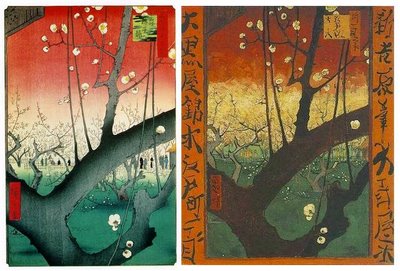letter to theo, 24 septembre, 1888
 "...If we study Japanese art, we discover a man who is undeniably wise, philosophical and intelligent, who spends his time - doing what? Studying the distance from the earth and the moon? No! Studying
"...If we study Japanese art, we discover a man who is undeniably wise, philosophical and intelligent, who spends his time - doing what? Studying the distance from the earth and the moon? No! Studyingthe politics of Bismarck? No! He studies … a single blade of grass.
But this blade of grass leads him to draw all the plants - then the seasons, the grand spectacle of landscapes, finally animals, then
the human figure. That is how he spends his life, and life is too short
to do everything.
"...come now, isnt it almost a true religion which these simple Japanese teach us, who live in nature as though they themselves were flowers. And you cannot study Japanese art, it seems to me, without becoming much gayer and happier, and we must return to nature in spite of our education and our work in a world of convention."
vincent william van gogh, to his brother theo, 24 september 1888
hiroshige's wood-cut flowering plumtrees at kameido (1857)
and vincent van gogh's oil version (1887)
and vincent van gogh's oil version (1887)
Labels: hiroshige ando, van gogh


5 Comments:
I am a big fan of Japanese woodblock prints (I have several hanging in my dining room) but even I wouldn't say that a Japanese artist "is undeniably wise, philosophical and intelligent." Like every other culture, the japanese surely have a lot of chaff mixed in with the wheat.
The thing that puzzled me about the quote you chose is that in one place, it says Japanese artists start with a single blade of grass and end up incorporating the whole big complex world, while in another place it says the Japanese are very simple and restrained. Am I missing something?
Lotus,
You have a very interesting blog here. Keep up the good work.
david--thanks for another great question. maybe you missed was that it was van gogh who said it? my fault--i left his name off, thinking it would be too obvious, but i've added it now.
far be it from me to analyze vincent van gogh, but he really did say both of those things in the same letter to his brother on that day nearly exactly one hundred eighteen years and two days ago, several translations of which are wandering around the net.
what do i think he meant? i think he's finding, and somewhat mystifying, something he is longing for: calm, simplicity. he also seems to be critiquing both how he sees men in the west spending their time, but also, possibly, just what the west had sent the japanese: many professors to teach, often at their own clammoring, these very same things.
though it's undoubtably mystified, i think i react to some degree that way too: it isn't my brain responding but my body, to the lines that seem more like limbs than posts, in the japanese and japonisme works.
limbolo--
thanks for the visit and the comment. you do too.
Lotusgreen, I saw these pictures at the Louis C Tiffany museum in Matsue. You really should visit!
Post a Comment
hi, and thanks so much for stopping by. i spend all too much time thinking my own thoughts about this stuff, so please tell me yours. i thrive on the exchange!
<< Home